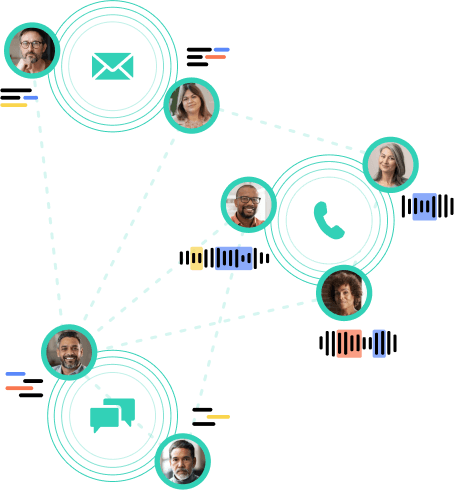Your customers are talking. Are you listening?
Leverage unstructured data sources to answer questions, provide quality service, and enhance customer support with artificial intelligence, machine learning, and natural language processing.
Start Listening
Authenticx analyzes customer conversations to surface recurring trends.

Prepare for Medicare AEP with impactful insights
A health insurer wanted to understand how members were responding to ANOC changes. Authenticx found inconsistencies in how agents were explaining coverage options.
Healthcare Conversational AI
Health information technology (HIT) is taking the field of healthcare by storm. There are many different kinds of HIT, from electronic health records (EHRs) to computerized physician order entry (CPOE), and even qualitative data analytics software such as Authenticx, which uses healthcare conversational AI.
Authenticx is a type of healthcare conversational AI that uses natural language processing to identify and quantify topics found in contact center communications. The data gained from these conversations can be used to change processes, improve staff communication, and overall increase customer satisfaction and retention at your healthcare organization. Other uses of conversational AI in healthcare might include applications such as chatbots. Authenticx is not a chatbot and isn’t used as a virtual assistant by the patient in any way, but it does help healthcare providers learn about and better understand the needs of the patient, especially post-discharge.
Chatbots are rapidly rising in usage and popularity, and many are wondering about possible chatbot healthcare use cases. Chatbots can be used in healthcare for many reasons. Some of the benefits of chatbots in healthcare are:
Scheduling appointments
Chatbots have a 24/7 availability to assist patients and avoid issues that may arise during normal business hours, such as long hold times, only to discover that there are not any available appointments. With chatbots, patients have access to instant assistance whenever they need it and can schedule appointments quickly and easily.
Finding critical information quickly
Searching a healthcare provider’s website isn’t always the most straightforward of processes – it might be difficult to locate office locations, hours, phone numbers, recommended schedules for pre-surgery and post-surgery appointments, etc. Healthcare chatbots can offer information to patients quickly so that the patient doesn’t have to locate all of that information themselves. Healthcare chatbots can be programmed to answer questions about certain conditions and appointments, such as “How long must I fast before surgery?” or what to expect during a medical procedure. Chatbots can also give patients information about the nearest medical facilities, their hours, nearby pharmacies, and drugstores for prescription refills.
AI Assistance leads to a reduction in care costs
Healthcare chatbots allow patients to schedule appointments, find information, learn about their condition, and prepare for their upcoming appointments – all without the presence of a healthcare professional. The education gained from interacting with the chatbot can lead to more informed healthcare decisions, leading to a reduction of overall healthcare costs.
While those were healthcare chatbot examples, there are other types of AI at work in healthcare. Generative AI in healthcare can be used to detect anomalies or abnormalities in patient data, aiding in the early detection of diseases. They can also be used to assist in the creation of new drug molecules by generating chemical structures that exhibit the desired results. These molecules can be further analyzed and tested by real healthcare professionals and scientists to test their viability for medication. Generative AI can also be used to help train natural language processing AI, which is often used in chatbots.
Chatbots In Healthcare
Chatbots in healthcare have many uses that all provide assistance to both healthcare staff and patients. A medical chatbot online can be used upon patient triage and symptom assessment, asking relevant questions to gather information about the patient’s condition, and the severity of symptoms and provide appropriate recommendations. The use of chatbots in healthcare can also be extended to things like appointment scheduling and reminders, medication management, health education and information, and more.
While conversational AI and chatbots are often used interchangeably, they are not the same thing. A chatbot requires conversational AI to exist, whereas conversational AI can exist on its own outside of a chatbot setting. When it comes to conversational AI vs. chatbot, conversational AIs can be used to analyze conversational data instead of participate in it.
A conversational AI chatbot can also be used to offer mental health support. Chatbots with natural language processing capabilities can provide information about mental health and give patients the opportunity to speak their feelings without judgment. Patients can have confidential conversations with a chatbot, share their feelings, and access resources for managing stress, anxiety, addiction, or whatever they are facing.
One of the most common uses of a conversational AI chatbot in healthcare is post-discharge support. Chatbots can provide follow-up care after discharge by engaging in automated conversations with patients, checking on their recovery process, and offering guidance on post-treatment instructions. Chatbots can answer common questions, address concerns, and flag conversations and patients to healthcare providers as necessary.
Several companies and healthcare tech/organizations have developed a chatbot for healthcare systems using artificial intelligence. Some of these healthcare chatbot projects are OneRemission, a chatbot specifically for patients with cancer, and Florence, a ‘personal nurse’ AI that can help patients take pills, track user health, and achieve healthcare goals. One of the most famous healthcare AI projects is IBM Watson, which actually won the game show Jeopardy! in 2011.
Conversational AI Platform
Conversational AI can exist without chatbots. Conversational AI platforms such as Authenticx are built to analyze conversational data without participating in the conversations themselves. Conversational AI analytics can be used to hear the actual voice of the customers and learn about what’s important to them.
Authenticx makes it possible for healthcare providers to gain insights that would otherwise go ignored. This is because much conversational data is often categorized as “dark data” or unstructured data. This can be text messages, phone calls, emails, or any other kind of data that is collected but goes unused. Authenticx consumes dark data and transforms it into insight, alerting healthcare providers of hidden barriers, motivators, and transformational possibilities.
Autheticx has several conversational AI use cases, including life sciences, insurance companies, and healthcare providers. Authenticx can even be used across different departments in the same organization, including Customer Support & Experience, Marketing, Operations, and Compliance.
Individuals have more options for healthcare today than ever before. This has led to something of a “consumer economy” for healthcare organizations, with each provider competing for patients. This means that healthcare organizations need to adopt a competitive and patient-focused mindset, offering low-cost and high-quality healthcare. Authenticx can assist in this endeavor by providing the insights that actually make a difference: patient voices.
Patients are calling in and contacting their healthcare providers every day – they’re emailing, calling offices, sending texts, filling out forms, and more. What is happening to all of that information? When they tell a call center agent that they’ve been placed on hold three times, and no one can answer their question, how is that communicated to the healthcare provider?
Authenticx can provide healthcare organizations with the information they need to make decisions about what matters most to their patients.
How It Works
Gain a deeper level understanding of contact center conversations with AI solutions.
Learn MoreAggregate
Pull customer interaction data across vendors, products, and services into a single source of truth.
Analyze
Collect quantitative and qualitative information to understand patterns and uncover opportunities.

Activate
Confidently take action with insights that close the gap between your organization and your customers.
Conversational AI Tools
Conversational AI tools can have a big impact on healthcare when leveraged properly. One of the biggest questions about conversational AI and chatbots is – will ChatGPT transform healthcare? While ChatGPT was not designed for healthcare applications, it can still be used in the healthcare setting for patient engagement and education, symptom assessment, and support for healthcare professionals, such as assembling research and more. This type of support can streamline and simplify many administrative processes and provide some relief to healthcare staff, lowering the costs of healthcare in the long run by improving both patient and staff satisfaction.
ChatGPT and other conversational AI tools, like a chatbot for medical students, can assist in training new healthcare professionals. Medical chatbots for students can provide study assistance, exam preparation, information retrieval, clinical support, and more. However, the benefits to patients and healthcare providers are a big part of conversational AI strategy.
When healthcare providers have actionable access to data that patients care about, everyone wins. Healthcare providers can make decisions that will positively impact patient satisfaction, and patients can receive better care and feel truly heard by their healthcare provider of choice.
Conversational AI strategy can be used in several ways within the healthcare organization. Healthcare marketers can use conversational data to discover challenges that their patients have faced and how the healthcare provider helped them to overcome them – in their own words. Conversational AI can be used in customer experience to identify disruptions in the patient journey. The data can then be used to make decisions that solve those disruptions, creating a better patient experience.
Future Of Conversational AI
Conversational AI trends continue to develop as AI becomes one of the biggest debates in the modern world. The conversational AI definition refers to technology that enables machines to engage in human-like conversations with users. Conversational AI leverages several AI techniques, including natural language processing, natural language understanding, machine learning, and more. These techniques and algorithms are what give machines the capability to understand, generate, and respond to human speech in a conversational way.
The future of conversational AI is expected to grow more advanced, personalized, and empathetic. There are also ethical considerations that need to be made as AI becomes more sophisticated. These concerns include privacy, data security, bias, and transparency. Conversational AI’s conversation capabilities are expected to grow as it learns and adapts to human language, making it possible for the AI to understand context, nuance, and sentiment. In many cases, AI can already detect sentiment, as Authenticx does. Conversational AI may also evolve to include multimodal interactions, interacting with images, videos, and even gestures. Many theorize that future conversational AI models will focus on emotional intelligence and empathy, becoming better equipped to recognize and respond to human emotions. This particular advancement would make a huge difference in healthcare, as many patients are struggling in one way or another and want the “human touch” of someone who can respond to their emotional needs.
While there is still much to be considered for the future of conversational AI in healthcare, it has already made a big splash and is expected to continue.